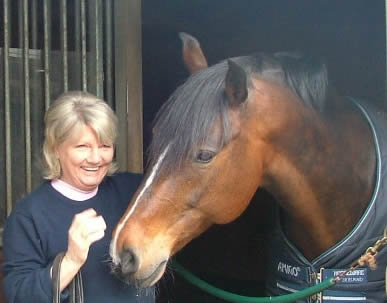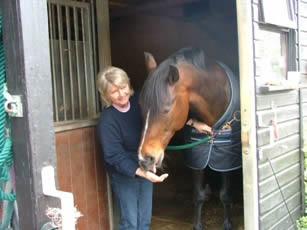A bit of history from Lingfield
It is over 26 years since courses for horse owners were first presented to small groups of riders and owners in Lingfield Surrey. From the archives of a website called Horse Talk we found this record of an interview with Paula Clements
The Lingfield Instructor Group. Sixteen successful years.
It all started on a Monday evening with helping people learn more about horse – and just 12 people in the living room of her home in Lingfield, Surrey. Then it moved to small venue rooms at various pubs in the area: The Hare and Hounds, the Old Horse at Home, Dormansland, The Woodcock, Newchapel.
Today as they celebrate another anniversary, the Lingfield Instructor Group, which is no longer based in Lingfield but is now 9 miles outside Dulverton, Somerset, is probably the largest, fastest-growing international equine distance-learning organisation in the world with thousands of students all around the globe aged between eleven-years and 67-years old.
At present, an eleven-year-old girl from Cheshire is studying Equine Care and Management on a shared course with her mother, and a 67 year-old man is studying Equine Psychology. Other students like Natasha in Northern Ireland and Marie in Glasgow are enrolled on Intermediate Diploma programmes in Equine Feeding & Nutrition while in Singapore and Dubai, Carl and Bema are studying Equine Livery Yard Management. Still more students in Norway, Greece, Slovenia, New Zealand, South Africa and even Australia are studying anything from Equine Psychology to Equine Management & Care.
The list of past students is equally impressive. Among them are Bill Maher, who studied Equine Management during his spell with the Grenadier Guards riding the drum horse. Two others have moved on to achieve professional qualifications and finally to up-sticks with their families and to respectively buy their own riding school on the Sussex coast and a Riding Holiday centre in Wales.
Says Paula Clements, who founded the organisation, “I feel passionately about horses and about the fact that they should be properly looked after. That’s really why I started the courses in the first place. As well as helping my clients improve their riding and training abilities, I helped them to learn more about the care of their horses. If the horses are well cared for and in a way which suits the riders abilities, they are happy and more willing to work well for their riders. The two things are totally and utterly linked.
“At first, we just had small groups. Then we gave talks and lectures Then people wanted notes of the lectures, Then as the demand grew and we started getting enquiries from more and more people from further and further afield, we turned it into what in those days was called a correspondence course. Today, of course, it’s called distance-learning. It is the same thing really. I never dreamt that it would turn out to be as big and as wide ranging as it has.”
Since they started, she estimates, that over 3,000 students from all over the world have taken any one of Lingfield’s horse courses which cover everything from general care to practical equine psychology.
 Says Paula, “People take the courses because they want to know what they are doing when they are handling and taking care of horses.
Says Paula, “People take the courses because they want to know what they are doing when they are handling and taking care of horses.
Some are young and just starting out on a career. Others have been away from horses for some time and want a re-fresher course.
Many are now running their own livery yards and find that the more knowledgeable owners are sometimes one step ahead of them. It puts them on the back-foot somewhat when their clients know more than they do. I think there is also a growing demand for qualifications. In many parts of the work people look to the UK for equine qualifications.”
Plus, of course, the fact that all Lingfield’s courses are written by trained, experienced, practical, professional horse people who are friendly and approachable. Every student has their own course tutor to call on throughout their course. The tutor is the person who wrote the course so they know their topic inside out.
Hannah Haskew, for example, wrote the course on Livery Yard Management and most of the Equine Psychology Course. Hannah is a well qualified BHS Instructor at Level 2 UKCC (UK Coaching Certificate), she has run a variety of stables and is a very experienced manager and equine therapist. She achieved student of the year on completion of her degree in Equine Science, gained her Masters and continues to train further. She has achieved (and continues to achieve) various qualifications, amongst them are McTimmony practitioner and qualified Equine Body Worker working closely with, and recommended by, vets in her area.
Hazel Reed is author of the professional books used by students aiming at their BHS Stages exams, such as the ‘Riding & Stable Management’ books and the ‘Preliminary Teaching Test’ book. Hazel knows her stuff as far as the exams are concerned. .She has published at least four books in this group as well as other books. Hazel is currently working on the final draft of the Practical Equine Psychology & Behaviour course.
Says Paula, “We also have Liz McIlwraith who owns and runs Bridge House Equestrian Centre in Slinfold, Sussex. Liz has a wealth of knowledge on feeding a huge variety of equines from competition horses to riding school ponies gained over her many years of owning the centre. Liz wrote the Equine Feeding & Nutrition Course. Liz is aiming to produce a How to Care for Your Pony course for younger students in the near future.
“Fiona Dent is the equine first aid specialist and is currently producing a course for us on this topic. Fiona is a well qualified BHS instructor at Level 3 UKCC with many years experience and a wide cleint base in Kent, Surrey & Sussex. Fiona is also a Riding for the Disabled Area Instructor and Assessor on the UKCC side for them too.
“We are currently looking for another instructor to join the team who could help us produce a good all round ‘schooling your horse’ course. The instructor has to be the right person though with a great deal of empathy with the new owner and prospective owner who are often mature people. They also need to be mature themselves and able to produce the sort of course that both novice and the more experienced owner would be interested in. It is not easy to find the right person. We are keen to get this course written very soon. We have a number of students interested and ready and waiting for help. If any mature instructors out there feel they can help we would love to hear from them.
 “Our course fees are quite low by comparison to some of the other equine courses available. This is because we have kept staffing levels as low as possible and our overheads are minimal by comparison to the big colleges with huge equestrian centres attached. A course on Equine Psychology & Behaviour for example, costs only £129 while a Level 1 course on equine care & management covering the whole gamut of equine care, costs just £150. “
“Our course fees are quite low by comparison to some of the other equine courses available. This is because we have kept staffing levels as low as possible and our overheads are minimal by comparison to the big colleges with huge equestrian centres attached. A course on Equine Psychology & Behaviour for example, costs only £129 while a Level 1 course on equine care & management covering the whole gamut of equine care, costs just £150. “
Adds Paula, “You couldn’t get better value anywhere else in the world.& In fact we are so confident that the Level 1 equine care & management course is the best value for this sort of course we offer a complete refund if any student can show us a course of similar length and content. It really is a very full and complete course covering just about every aspect of management. It is therefore ideal for those who are experienced and want to update as well as those with a general interest in learning more. We keep the fees low because we want to help people look after their horses in a more natural and healthy way – it is the horse which is important to us not the fees.”
Hence the ever-growing demand.
Paula’s own interest in horses began when she just nine-years-old. It started with being taken for a ride by a family friend at what was then Carters Stables in Bookham (now Bookham Riding Centre) to riding lessons with two young women who had started a tiny riding school in Kennel Lane in Bookham Surrey. After much asking and wishing by the age of 11, her parents, who were not horsey, found her a steady 13 hand welsh cross to loan. From there her passion grew and stayed with her. Today Paula still finds time to ride out on Exmoor as often as possible.
“I think we have a duty to our horses to ensure they have a good life and to reduce the number of welfare cases we see. Part and parcel of that is to help owners feel more confident about how they care for their horses on a day to day basis,” says Paula.
That’s what she started doing when the courses were originally set up 16-years ago.
That is what she is still doing today.
The post A bit of history from Lingfield appeared first on Lingfield Correspondence.

